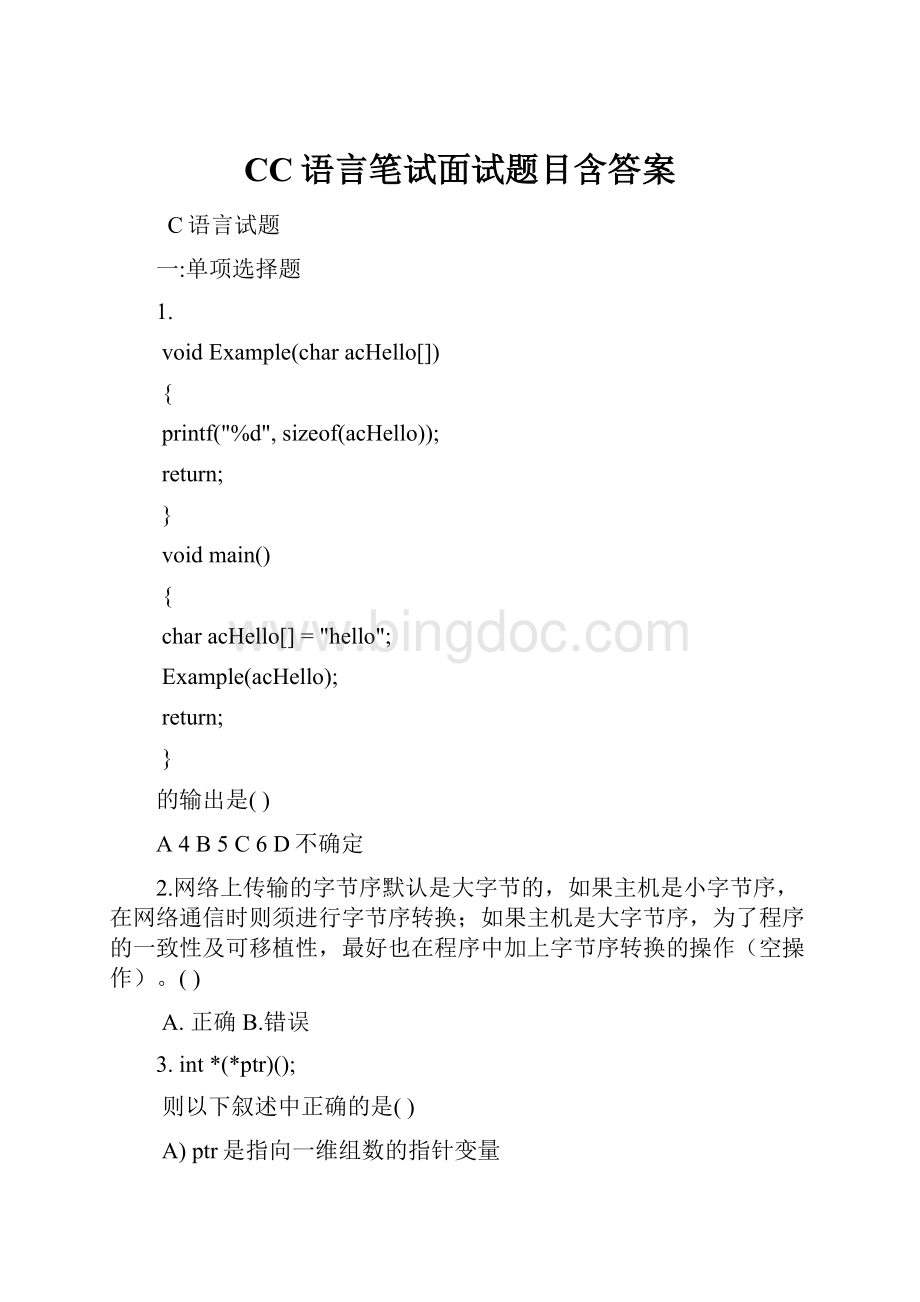CC语言笔试面试题目含答案.docx
《CC语言笔试面试题目含答案.docx》由会员分享,可在线阅读,更多相关《CC语言笔试面试题目含答案.docx(50页珍藏版)》请在冰点文库上搜索。

CC语言笔试面试题目含答案
C语言试题
一:
单项选择题
1.
voidExample(characHello[])
{
printf("%d",sizeof(acHello));
return;
}
voidmain()
{
characHello[]="hello";
Example(acHello);
return;
}
的输出是()
A4B5C6D不确定
2.网络上传输的字节序默认是大字节的,如果主机是小字节序,在网络通信时则须进行字节序转换;如果主机是大字节序,为了程序的一致性及可移植性,最好也在程序中加上字节序转换的操作(空操作)。
()
A.正确B.错误
3.int*(*ptr)();
则以下叙述中正确的是()
A)ptr是指向一维组数的指针变量
B)ptr是指向int型数据的指针变量
C)ptr是指向函数的指针,该函数返回一个int型数据
D)ptr是指向函数的指针,该函数的返回值是指向int型数据的指针
4.此函数实现把32位IP地址(网络序)以字符串的方式打印出来:
char*IpAddr2Str(unsignedlongulIpAddr)
{
charszIpAddr[32];
unsignedlongulLocIpAddr=ntohl(ulIpAddr);//把网络序转话为主机序
(void)VOS_sprintf(szIpAddr,"%d.%d.%d.%d",ulLocIpAddr>>24,
(ulLocIpAddr>>16)&0xff,(ulLocIpAddr>>8)&0xff,ulLocIpAddr&0xff);
returnszIpAddr;
}
下面描述正确的是():
A、数组szIpAddr空间不够;
B、函数返回局部数组szIpAddr变量地址;
C、输出的IP地址次序颠倒;
5.
#defineOK0
#defineERR1
#defineERROR(-1)
#defineBUFFER_SIZE256
char*GetMemory(unsignedlongulSize)
{
char*pcBuf=NULL;
pcBuf=(char*)malloc(ulSize);
if(NULL==pcBuf)
{
returnERROR;
}
returnpcBuf;
}
voidTest(void)
{
char*pszBuf=NULL;
pszBuf=GetMemory(BUFFER_SIZE);
if(NULL!
=pszBuf)
{
strcpy(pszBuf,"HelloWorld!
\r\n");
printf(pszBuf);
free(pszBuf);
}
return;
}
如下描述正确的是:
A、pszBuf指向的内存不能超过255
B、GetMemory函数的异常分支返回了-1,是一个非法地址
C、GetMemory中异常分支没有释放空间;
D、pcBuf为局部指针,指向的内存将在GetMemory被调用后释放
6、#include"stdio.h"
unsignedshort*Sum(unsignedchara,unsignedcharb)
{
unsignedshorts=0;
s=a+b;
return&s;
}
intmain()
{
unsignedshort*p=NULL;
unsignedchara=1,b=2;
p=Sum(a,b);
printf("%u+%u",a,b);
printf("=%u\n",*p);
return0;
}
程序执行结果是()
A.1+2=0B.1+2=3C.1+2=NULLD.不可预测
7、设有如下定义:
BOOLgStatusA=FALSE;
BOOLgStatusB=TRUE;
intgVarA=100;
intgVarB=100;
则执行main函数后gVarA和gVarB的值分别为()
BOOLCheckA()
{
if(gStatusA)
{
gVarA++;
}
else
{
gVarA--;
}
returngStatusA;
}
BOOLCheckB()
{
if(gStatusB)
{
gVarB++;
}
else
{
gVarB--;
}
returngStatusB;
}
intmain(intargc,char*argv[])
{
if(CheckA()&&CheckB())
{
printf(“StatusOK”);
}
return0;
}
A,99和100B,99和101C99和99D101和99
8.下面的代码中,函数Test执行完毕后,希望输出无符号长整型的1。
voidVarInit(unsignedchar*pucArg)
{
*pucArg=1;
return;
}
voidTest()
{
unsignedlongulGlobal;
VarInit(&ulGlobal);
printf("%lu",ulGlobal);
return;
}
下面描述正确的是:
()
A.给VarInit()函数传递的参数类型错误
B.printf()输出格式错误
C.传给VarInit()中参数pucArg的值为空指针
9、
voidAddFunc(unsignedinta,unsignedintb,unsignedint*c)
{
*c=a+b;
}
voidmain(void)
{
unsignedchare=200;
unsignedcharf=100;
unsignedcharg=0;
AddFunc((unsignedint)e,(unsignedint)f,(unsignedint*)&g);
printf("%d",g);
}
下面说法正确的是():
A对g进行类型转换导致函数调用时写内存越界;
B对e、f进行类型转换导致函数调用时写内存越界;
C函数调用时不能改变g的值。
10、voidmain(void)
{
unsignedchara=200;
unsignedcharb=100;
unsignedcharc=0;
c=a+b;
printf("%d%d",a+b,c);
}
下列程序的执行结果为()
A300300
B4444
C30044
D44300
11、在X86,VC++6.0环境下,有下列程序
#include
intmain()
{
charcA;
unsignedcharucB;
unsignedshortusC;
cA=128;
ucB=128;
usC=cA+ucB;
printf("0x%x",usC);
usC=cA+(short)ucB;
printf("0x%x",usC);
usC=(unsignedchar)cA+ucB;
printf("0x%x",usC);
usC=cA+(char)ucB;
printf("0x%x",usC);
return0;
}
输出结果是()
A)0x00x00x1000xff00
B)0x00x1000x1000xff00
C)0x00x1000x1000x0
D)0x00x00x1000x0
12.switch(c)中的c的数据类型可以是char、long、float、unsigned、bool.()
A.正确B.错误
13.voidExample()
{
inti;
characNew[20];
for(i=0;i<10;i++)
{
acNew[i]='0';
}
printf("%d\n",strlen(acNew));
return;
}
的输出为()
A0B10C11D不确定
14.如下程序用于把"blue"字符串返回:
char*GetBlue(void)
{
char*pcColor;
char*pcNewColor;
pcColor="blue";
pcNewColor=(char*)malloc(strlen(pcColor));
if(NULL==pcNewColor)
{
returnNULL;
}
strcpy(pcNewColor,pcColor);
returnpcNewColor;
}
下面描述正确的是:
A、字符串“blue”存放在栈内;
B、函数GetBlue返回局部变量地址;
C、内存空间分配长度不够,strcpy函数拷贝越界;
15.给出以下定义:
characX[]="abcdefg";
characY[]={'a','b','c','d','e','f','g'};
则正确的叙述为()
A)数组acX和数组acY等价B)数组acX和数组acY的长度相同
C)数组acX的长度大于数组acY的长度D)数组acX的长度小于数组Y的长度
16.有以下程序段
characArr[]="ABCDE";
char*pcPtr;
for(pcPtr=acArr;pcPtr{
printf("%s\n",pcPtr);
}
return;
输出结果是()
A)ABCDB)AC)ED)ABCDE
BDBCDE
CCCDE
DBDE
EAE
17.voidExample()
{
inti;
characNew[20]={0,0,0,0,0,0,0,0,0,0,0,0,0,0,0,0,0,0,0,0};
for(i=0;i<10;i++)
{
acNew[i]='0';
}
printf("%d\n",strlen(acNew));
return;
}
的输出为:
()
A0B10C11D不确定
18.如下程序用于把"blue"字符串打印出来:
voidPrintBlue()
{
charpcBlue[]={'b','l','u','e'};
printf("%s",pcBlue);
return;
}
下面描述正确的是():
A、pcBlue数组初始化时没有字符串结束符;
B、数组pcBlue定义时必须指明长度;
19.如下代码实现中,FuncA为每毫秒定时执行的函数,在该函数中,需要实现每TIME_INTERVAL毫秒执行一次DO_Something()的操作。
请指出段代码中的错误:
#defineULONGunsignedlong
#defineTIME_INTERVAL200
voidDoSomething(void)
{
/*....*/
return;
}
voidFuncA()
{
staticULONGulPreCall=0;
ULONGulNowInMsHigh=0;
ULONGulNowInMsLow=0;
(VOID)VOS_Tm_Now(&ulNowInMsHigh,&ulNowInMsLow);/*获取当前的时间,以毫秒为单位,用64bits表示,ulNowInMsHigh为高32位,ulNowInMsLow为低32位*/
if((0==ulPreCall)||(ulNowInMsLow>=(ulPreCall+TIME_INTERVAL)))
{
ulPreCall=ulNowInMsLow;
}
else
{
return;
}
DoSomething();
return;
}
A、函数FUNC_A第一次被调用时,不执行Do_Something()操作;
B、函数FUNC_A功能在一段时间后失效,因为ulNowInMsLow溢出翻转;
C、ulPreCall不应该定义为静态变量;
20、
#defineNULL0
#defineMEM_OK0
#defineMEM_ERR1
enumENUM_STAT_ITEM
{
STAT_ITEM0,
STAT_ITEM1,
STAT_ITEM_BUTT
};
typedefstructtag_PERM_COUNT_STAT_INFO
{
unsignedshortstat_item;
unsignedshortnumber;
}_SPermCountStatInfo;
_SPermCountStatInfopcsi[STAT_ITEM_BUTT]=
{
{STAT_ITEM0,16000},
{STAT_ITEM1,50000},
}
unsignedlong*pulStatDataBuffer=NULL;
unsignedshortAllocPermMemory(void)
{
unsignedshortusBufferSize=0;
unsignedshortusLoop=0;
for(usLoop=0;usLoop{
usBufferSize+=pcsi[usLoop].number;
}
pulStatDataBuffer=(unsignedlong*)malloc(sizeof(unsignedlong)*usBufferSize);
if(NULL==pulStatDataBuffer)
{
returnMEM_ERR;
}
returnMEM_OK;
}
下面说法正确的是():
Aunsignedshort类型不能表示循环体中将16000与50000相加的和66000
B数组pcsi的number域是unsignedshort类型,不能表示50000这么大的数字
C循环条件应该改为usLoop<=STAT_ITEM_BUTT
21.请指出下面这段代码中的错误:
unsignedlongFuncB(unsignedlongulCount)
{
unsignedlongulSum=0;
while(0<=ulCount)
{
ulSum+=ulCount;
ulCount--;
}
returnulSum;
}
voidtest(void)
{
unsignedlongulTotal=0;
ulTotal=FuncB(10);
printf("%lu",ulTotal);
}
下面描述正确的是():
A、while循环判断始终为真;
B、test打印输出55;
C、循环体内在执行2的32次方后,ulSum开始溢出翻转;
22.请指出下面程序的错误:
voidTest(void)
{
char*szStr=(char*)malloc(100);
if(NULL==szStr)
{
return;
}
strcpy(szStr,"hello");
free(szStr);
if(NULL!
=szStr)
{
strcpy(szStr,"world");
printf("%s",szStr);
}
return;
}
下面描述正确的是()
A、strcpy没有将结尾符拷贝到szStr中
B、对释放空间的指针进行拷贝操作
C、szStr被free后,szStr即为空。
23.#defineBUFFER_SIZE256
voidGetMemory(char**ppszBuf)
{
if(NULL==ppszBuf)
{
ASSERT(0);
return;
}
*ppszBuf=(char*)malloc(BUFFER_SIZE);
return;
}
voidTest(void)
{
char*pszBuf=NULL;
GetMemory(&pszBuf);
strcpy(pszBuf,"helloworld\r\n");
printf("%s",pszBuf);
free(pszBuf);
return;
}
下面说法正确的是():
A、pszBuf的值永远为NULL;
B、malloc内存后没有判断是否成功;
C、strcpy拷贝越界;
D、GetMemory无法将申请的内存地址传递给pszBuf;
24、请问下面函数中1、2、3应该填入什么语句才合理?
()
A、不添,不添,不添
B、free(pMsg);,free(ptmpMsg);,不添
C、free(pMsg);,free(ptmpMsg);,free(ptmpMsg);
D、不添,free(pMsg);,free(ptmpMsg);
E、free(pMsg);,free(pMsg);,free(ptmpMsg);
F、不添,不添,free(ptmpMsg);
#defineCOMM_MSG_LEN100
char*GetMessageBuffer(intmalloc_len)
{
char*ptr=NULL;
ptr=(char*)malloc(malloc_len)
returnptr;
}
intFuncTest(void)
{
intmalloc_len=COMM_MSG_LEN;
char*pMsg=NULL;
char*ptmpMsg=NULL;
pMsg=GetMessageBuffer(malloc_len);
if(NULL==pMsg)
{
____1___
returnERROR;
}
fillMessage(pMsg);
sendMessage(pMsg);
ptmpMsg=GetMessageBuffer(malloc_len);
if(NULL==ptmpMsg)
{
____2___
returnERROR;
}
FillMessage(ptmpMsg);
SendMessage(ptmpMsg);
free(pMsg);
____3___
returnOK;
}
25.以下叙述中不正确的是()
A)在不同的函数中可以使用相同名字的变量
B)函数中的形式参数是在栈中保存
C)在一个函数内定义的变量只在本函数范围内有效
D)在一个函数内的复合语句中定义的变量在本函数范围内有效(复合语句指函数中的成对括号构成的代码)
26.全局变量可以定义在被多个.C文件包含着的头文件中。
()
A.正确B.错误
27.在函数内部定义的变量(静态变量、寄存器变量等特殊变量除外)的内存是在栈内存中,所以在定义函数内部的变量的时候,一定要保证栈不能够溢出。
如果临时变量占用空间较大,应该使用内存申请的方式,这样该变量指向的内存就是在堆内存中了。
()
A.正确B.错误
28.局部变量可以和全局变量重名,编译的时候不会出现错误,但一旦不小心,就可能导致使用错误变量,所以在定时局部变量的时候,不要和全局变量重名。
()
A.正确B.错误
29.设有如下定义:
unsignedlongpulArray[]={6,7,8,9,10};
unsignedlong*pulPtr;
则下列程序段的输出结果为()
pulPtr=pulArray;
*(pulPtr+2)+=2;
printf("%d,%d\n",*pulPtr,*(pulPtr+2));
A)8,10B)6,8C)7,9D)6,10
30.structstu
{
intnum;
charname[10];
intage;
};
voidFun(structstu*p)
{
printf("%s\n",(*p).name);
return;
}
voidmain()
{
structstustudents[3]={{9801,"Zhang",20},
{9802,"Wang",19},
{9803,"Zhao",18}};
Fun(students+2);
return;
}
输出结果是()
A)ZhangB)ZhaoC)WangD)18
31.以下程序运行后,输出结果是()
voidmain()
{
char*szStr="abcde";
szStr+=2;
printf("%lu\n",szStr);
return;
}
AcdeB字符c的ASCLL码值
C"abcde"这个常串中字符c所在的地址D出错
32.设有以下宏定义:
#defineN3
#defineY(n)((N+1)*n)/*这种定义在编程规范中是不允许的,如果你在实际中这么用了,请自打手心三下*/
则执行语句:
z=2*(N+Y(5+1));后,z的值为()
A)出错B)42C)48D)54
33、有如下宏定义和结构定义
#defineMAX_SIZEA+B
struct_Record_Struct
{
unsignedcharEnv_Alarm_ID:
4;
unsignedcharpara1:
2;
unsignedcharstate;
unsignedcharavail:
1;
}*Env_Alarm_Record;
pointer=(struct_Record_Struct*)malloc(